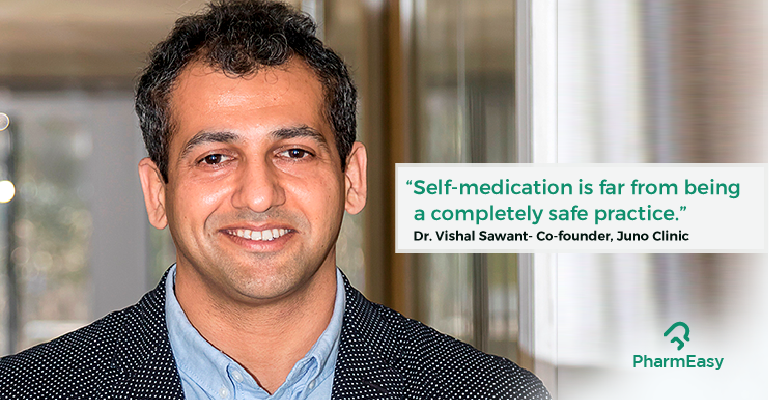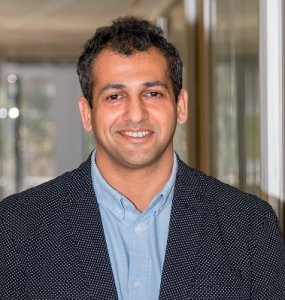Say “NO” To Self Medication!!
By Dr. Nikita Toshi +2 more

Get,

to manage your symptom
Get your,


4 Cr+ families
benefitted

OTP sent to 9988776655



You’ve successfully subscribed to receive
doctor-approved tips on
Whatsapp

Get ready to feel your best.

Hi There,
Download the PharmEasy App now!!


Register to Avail the Offer
Send OTPBy continuing, you agree with our Privacy Policy and Terms and Conditions

Hi There,
Sign up on PharmEasy now!!
Trusted by 4 crore+ families

OTP sent to 9988776655



You have unlocked 25% off on medicines




Code: NU25
By Dr. Nikita Toshi +2 more
What do you do when you have a bad headache and don’t know which medicine to take? Well, you pick up your smartphone and search the internet for its treatment and medication. There! You have options, you buy the listed medicine, consume it, and your headache is gone! Relieved? It’s that simple, isn’t it? But, in reality, you just made it all quite complicated. This kind of trending behavior is a major form of self-care and is known to be ‘self-medication’. Which in other words can be defined as -the use of medicine without any professional supervision.
The most commonly available OTC medications are painkillers, cough and cold remedies, anti-allergy medicines, vitamins, and energy tonics. But, to our surprise now even antibiotics are being taken by many people without any prescription from a doctor. Although some of the medications for common diseases are considered risk free their continuous, excessive, and prolonged use can also lead to serious side effects and unfavorable reactions.

According to a recent study in the healthcare sector, the percentage of self-medication has changed a lot and it all depends on the various demographics and regions. The prevalence of self-medication seems to be mainly high in professional students. The study also reveals that the current frequency of self-medication is high amongst young individuals and the literate working class who do not have enough time to visit a physician. Other reasons include easy access: Purchase of medicines from several medical stores, which provide the medicine without any prescription. Other factors include a Fragmented healthcare system, waiting time, healthcare cost, and lack of awareness. And the percentage of such cases of self-medication is increasing in India on a daily basis.
This kind of self-medicating behavior is a growing concern in society now. The prime reason why it’s growing further is that health and technology now go-hand-in hand. Initially, the use of technology in healthcare was to make things better and easy but over a period of time, technology is accessible to everyone around and so is the right to know through the digital revolution.
Technology is embedded in our everyday lives whether we realize it or not. Everything one needs to know is now just a click away. Getting ill and finding or creating self-prescription is a very common practice. It does come easy and second, it costs nothing in terms of money. It sure is helpful but if we continue this way, it can cause more repercussions than the benefits. This kind of practice by patients gets them towards greater independence in making decisions about the management of minor illnesses, thereby promoting empowerment.
Misuse and abuse of correct medications is one of the biggest drawbacks of self medication and in fact these patients report to hospital when worsened health situation than they were initially suffering from.
Dr. Ashish Bajaj ,M.B.B.S., M.D. in Clinical Pharmacology and Toxicology
Self-medication is associated with risks such as misdiagnosis, use of excessive drug dosage, prolonged duration of use, drug interactions, and polypharmacy. The latter may be particularly problematic in the elderly. Self-medication is far from being a completely safe practice. Potential risks of self-medication practices include incorrect self-diagnosis, delays in seeking medical advice when needed, infrequent, but severe adverse reactions, dangerous drug interactions, incorrect manner of administration, incorrect dosage, incorrect choice of therapy, masking of severe disease and risk of dependence and abuse.
According to recent reports, most drugs for self-medication were obtained from the pharmacy or drug shops; and the most commonly used drugs were paracetamol and prior experience and the non-seriousness of the illness were the top two reported factors for self-medication. Self-medication was practiced with a range of drugs from the conventional anti-pains to antibiotics. Not just this, even those medicines used for perceived minor illnesses and those for some chronic or recurrent conditions are potentially harmful.
Irrational use of medicines is now a major problem. As per WHO, more than half of all the medicines are prescribed, dispensed or sold inappropriately; and that half of the patients take them incorrectly, irregularly, or not at all. Although the practice of self-medication appears to be inevitable; drug authorities and health professionals need to educate people about the cons of self-medication. Low compliance to prescribed medical interventions is a major concern in the healthcare sector.
A doctor should share a healthy relationship with his patients and give them necessary information now and then, and most importantly encourage education about their own illness. This in turn would prove to be an effective way to ensure the correct use of medications by the patients. The pharmacist on the other hand can also play an effective role in discouraging self-medication. They should stop dispensing any prescription medicine without a prescription and during this course, the risk of self-medication should be clearly explained to discourage the patient from doing so. The pharmacist should identify the symptoms of complex and minor illnesses and respond to them accordingly or refer the patient to the doctor if needed. Above all, we as educated individuals should value our health and stop this practice of self-medication. It’s always better to understand your illness and the treatment options for it by a doctor and adhere to the treatment as advised.
Remember:
“Beware of false knowledge; it is more dangerous than ignorance.” – George Bernard Shaw
Written by:

Dr. Vishal Sawant is the co-founder of Juno Clinic (www.juno.clinic), India’s leading online and offline mental wellbeing clinic. He is one of the most well-known psychiatrist in Mumbai who has been in practise for over 17 years and in the past was associated with institutes like Dr. RN Cooper Hospitals and Guru Nanak Hospital, Bandra. Dr. Sawant believes that each person is unique and the treatment method he deploys reflect that fact. His special interest areas include mood disorders, schizophrenia, depression, personality problems and relationship counselling. He provides a warm, supportive, and interactive environment to explore and resolve patients’ concerns by understanding their origin and helping them acquire the skills to utilize, implement and attain the changes they want to achieve in their lives.
Dr. Sawant is involved in a considerable amount of community psychiatry work covering awareness creation, psycho-education and diagnosis through his association with several Charitable Trusts.
Disclaimer: The information provided here is for educational/awareness purposes only and is not intended to be a substitute for medical treatment by a healthcare professional and should not be relied upon to diagnose or treat any medical condition. The reader should consult a registered medical practitioner to determine the appropriateness of the information and before consuming any medication. PharmEasy does not provide any guarantee or warranty (express or implied) regarding the accuracy, adequacy, completeness, legality, reliability or usefulness of the information; and disclaims any liability arising thereof.
Links and product recommendations in the information provided here are advertisements of third-party products available on the website. PharmEasy does not make any representation on the accuracy or suitability of such products/services. Advertisements do not influence the editorial decisions or content. The information in this blog is subject to change without notice. The authors and administrators reserve the right to modify, add, or remove content without notification. It is your responsibility to review this disclaimer regularly for any changes.

Leave your comment...
Comments